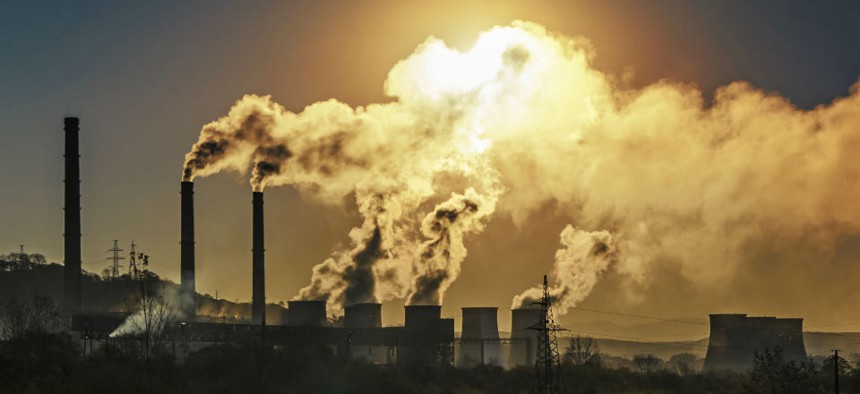
Tatiana Grozetskaya / Shutterstock.com
Here's One Way Obama Could Protect EPA Regulations From the GOP Senate
The Keystone XL pipeline could be a good bargaining chip.
Rapid climate change sparks tornados and floods, battering the world and throwing Americans into a new era of fear.
That’s the apocalyptic premise of the 2004 film The Day After Tomorrow. In reality, climate change is a more distant threat—and it’s all about the day after Tuesday, when Republicans woke up to firm control of both houses of Congress. The environment could again be on the agenda. As with on tax reform and trade agreements, Republicans feel there’s a chance for agreement with President Obama on the Keystone XL pipeline: John Boehner and Mitch McConnell specifically called for its construction in a Wall Street Journal op-ed yesterday.
The northern leg of the pipeline, which would carry more than 800,000 barrels a day of carbon-heavy crude from Alberta’s oil sands to Nebraska (before it heads for the Gulf Coast), has been held up for years by political and environmental concerns. Because it would cross the border from Canada, the pipeline requires a permit from the State Department. The energy company TransCanada first applied for a permit in 2008; in 2012, before the elections and after Congress set a tight deadline, Obama rejected the $8 billion project. But TransCanada reworked the application and the State Department completed its environmental review. Technically, Secretary of State John Kerry will make the call as to whether the pipeline is in the “national interest,” and Obama says it’s an “independent process” that he’s going to allow to play out, but it’s hard to imagine President Obama not having the final say on an issue of such political and policy significance.
Some legislators want to wrest that decision away. The House has previously voted to approve the pipeline over the president’s head. In May, Harry Reid actually offered Republicans a vote on a stand-alone Keystone bill if they passed a bipartisan energy-efficiency bill. Republicans demanded amendments on increasing liquefied natural-gas exports, Reid shut them down, and Republicans blocked the bill in another example of the procedural battles that have plagued the Senate for most of Obama’s presidency.
They will be in the 114th. New Republicans like Cory Gardner and Joni Ernst, along with a handful of Democrats, should give presumptive Majority Leader Mitch McConnell a filibuster-proof majority on the issue, but not enough to override a presidential veto. The question becomes whether Obama would use one.
That State Department review would give Obama some cover if he decides the pipeline passes muster. While the crude oil in Alberta’s tar sands is dirtier than regular oil, and takes more energy to extract and process, State says most of the oil will find its way to market anyway—traveling by rail and thus increasing the chance of a spill. And although the EPA and environmentalist groups have criticized those conclusions, the pipeline’s impact on global warming would be, by any measure, tiny compared to that of administration’s important new rules for power plant emissions.
McConnell struck a conciliatory tone in his post-election press conference, but Friday morning, in an interview with the Lexington Herald-Leader, the Kentuckian who ran against the “war on coal” had threatening words for anyone concerned about the environment:
But when it comes to looking out for Kentucky, a promise that was central to McConnell's campaign message, the senator said his top priority is "to try to do whatever I can to get the EPA reined in."
"It will be hard because the only good tool to do that ... is through the spending process, and if (President Barack Obama) feels strongly enough about it, he can veto the bill…"
As he rattled off the coal-producing counties he won Tuesday for the first time in his career, McConnell said he feels a "deep responsibility" to stop the Environmental Protection Agency from regulating carbon dioxide emissions at coal-burning power plants.
Those statements are potentially at odds with McConnell’s promise Wednesday that “there is no possibility of a government shutdown” on his watch. Attaching anti-EPA amendments to must-pass spending bills is precisely the sort of brinkmanship that could bring government to a halt.
Could a Keystone deal avert a showdown? Securing those EPA rules is crucial for Obama’s legacy, and Keystone’s political significance outweighs its policy impact—if approval helps protect power plant regulation, it’s worth doing for the administration. Key advisor John Podesta, whose opposition to the project is so strong he’s officially recused himself from the decision-making process, will likely be gone by the new year. The president could acquiesce on an issue two-thirds of the public supports and save the veto pen for bigger, possibly Obamacare-related fish.
Of course, approval would infuriate the environmentalists who constitute a major part of Obama’s base, not to mention Secretary Kerry, who regularly highlights the importance of tackling climate change in his public addresses. Obama would have to weigh the leverage he would gain with Republicans against the strong liberal opposition. It’s the sort of challenge that leaves no one perfectly satisfied.
Nevertheless, the Keystone XL pipeline offers a divided government the chance to show voters some progress. When the Republican-led Congress opens for business next year, Barack Obama will sit down with Mitch McConnell to chart a workable path. Expect the bourbon and the oil to flow.
(Image via Tatiana Grozetskaya / Shutterstock.com)






